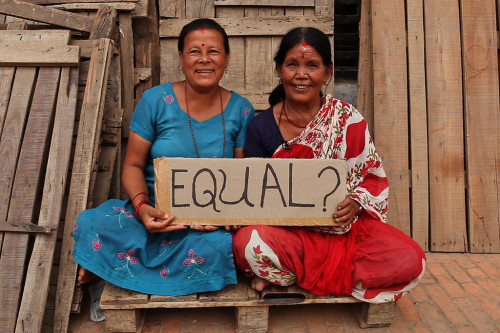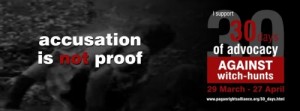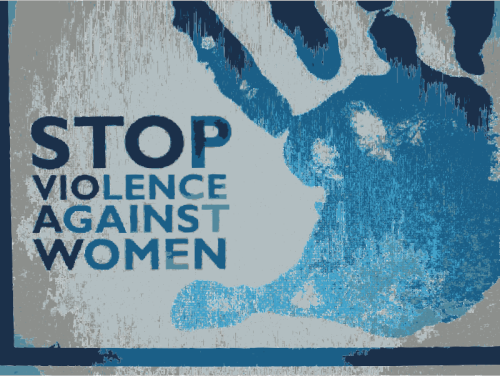TWH – In the U.S., March is national Women’s History Month, and Sunday was International Women’s Day. Around the world, individuals and organizations celebrated the role and influence of women in society. Pagans and Heathens were among them. There is much to celebrate. In many places, women have come a “long way baby” from the Victorian days of limited opportunity and arranged marriages.
However, this is not the case everywhere. Limited opportunities and crimes against women persist throughout the world, manifesting in many different ways. Last March, former U.S. president Jimmy Carter was quoted as saying in an interview with NBC, violence against women is “the worst and most pervasive and unaddressed human rights violation on Earth.”
According to a recent New York Times article,”35 percent of women worldwide, more than one in three, have experienced physical violence in their lifetime.” In that same article, it is reported that “38 percent of women who are murdered are killed by their partners.”This past Monday and Tuesday, the U.N. convened the Commission on the Status of Women and Girls. During the two-day session a number of prominent international women spoke about conditions in their countries. Generally, the speakers agreed that the problem is very serious and highly complex. As such, there is not one single solution that will fit every country and every culture.
In the U.N.’s official report, Phumzile Mlabmbo-Ncguka, undersecretary-general for Gender Equality and the Empowerment of Women and executive director of U.N.–Women was described as saying:
We need urgent action and much stronger political commitment.” Human rights were interdependent and indivisible, Mlabmbo-Ncguka said, adding that men must be partners politically and in the home, including as parents. Men and boys were key to dismantling the patriarchy. That meant, among others, saying “no” to early marriages. The bold, brave acts of one Head of State or one student leader could have far-reaching effects. “We must make the economy work for women,” she stressed, adding, “empowering women empowers nations
Unfortunately, some of the most horrific, violent crimes committed against the world’s women are connected to witchcraft. It is often said that the historical European and American witch-hunts were simply organized attacks on women. In contemporary society, this seems to be, at least partly, true. Whether the reasons or motivations are the same would be a project for sociologists and historians. However, it is enough to know that the current witch-hunts and related tragedies are very real, and women are most commonly the victims.
In June 2014, the U.N. released a report opening with the question, “Did you know violence and abuse against elderly women, the world’s fastest growing demographic group, range from sexual violence, property grabbing, financial abuse and increasingly, extreme violence against older women accused of witchcraft?” It continues on to say, “Witchcraft accusations that are used to justify extreme violence against older women are reported in 41 African and Asian countries…”
But none of that is news. Women, specifically older women, have been the primary victims of witchcraft violence for years. However, what is news, is the growing and very recent pressure worldwide to fix the problem.
In Monday’s U.N. Session, Nana Oye Lithur, minister for Gender, Children and Social Protection of Ghana, reported on the positive momentum and strides being made in her own country in an effort to bring about gender quality.The report describes her as saying specifically, “The [Ghana] Ministry had recently closed down one of the country’s ‘witch camps,’ which had held captive a number of women accused of being witches.” The December 2014 closing was marked as an historical event in the fight for women’s rights.

Women in Nepal. [From Video Still. ©Stephan Bachenheimer/World Bank SB-NP01]
Unfortunately, laws don’t necessarily bring an end to the violence. A 57-year-old woman, believed to be a witch, was just found “thrashed” in a village in Nepal. A recent article out of India suggests one of the reasons for continued hunts is a lack of law enforcement education. The article says:
Murders and other serious crimes in the name of witchcraft, sorcery and superstitious practices continue unabated in the State despite more than a year of enactment of Odisha Prevention of Witch Hunting Act, 2013, thanks to utter ignorance of its provisions among law enforcers on the ground.
The article adds that India is now working to educate its local police force.
In Africa, Tanzania’s government has recently taken a different approach. This January, it outlawed the actual practice of witchcraft. Over the past several years,Tanzania has seen a marked increased in the number of albino killings caused by so-called “witch doctors,” who propagate fear and superstition. Many locals believe that the limbs of a person with albinism have magical powers. According to a Red Cross report, these “witch doctors” will pay upward of “$75,000 for a complete set of albino limbs.” While this horrific violence is not at all limited to women, it is yet another abuse in a long list. Last year, the Huffington Post featured stories from a number of Tanzania’s albino women and their struggle to survive.
But murder and dismemberment are not the only problems caused by the propagation of witchcraft superstitions. According to a recent BBC report, the U.K. is facing a similar issue with the African Sex Trade industry. The article reads “British courts have found difficulty in bringing African sex-traffickers to justice because a belief in black magic and juju “spells” makes victims afraid to testify.” The women, taken primarily from Nigeria, are made to believe that these “witch doctors” hold powers of them and, as a result, are terrified to fight back or speak out.
The problem here is twofold. There are women, mostly elderly, who are being accused of witchcraft and, consequently, face abuse, confinement and death. Then, there are others, again mostly women, who are being manipulated through fear of witchcraft, into prostitution, a life of solitude, abuse, dismemberment and death. In some cases, the governments have banned witch-hunting and, in others, witchcraft itself.

Unfortunately, the latter legislation causes problems for legitimate Pagans, folk practitioners, or others using magic for purely spiritual purposes, such as WITZAN in Nigeria. Members of SAPRA have been working to reform these laws within their own country of South Africa, while also raising awareness for the problem. March 29 marks the beginning of SAPRA’s annual event called “30 Days of Advocacy Against Witch Hunts.”
The problem rages on with no end in sight, and not just in the countries mentioned above. Equally as troublesome is that “witchcraft,” even if it’s just in name, is being used as a method to promote gender inequality and to justify the abuse of women and girls.
At this week’s 59th session of the Commission on the Status of Women and Girls, Secretary-General Ban Ki-moon was described as saying:
Women continued to suffer disproportionately from the economic crisis, from the impacts of climate change, from the displacement caused by conflict, persecution and other challenges. Extremist groups continued to ‘viciously and systematically attack girls and women…
This work includes the detangling of cultural fears and gender-biases, from superstitions, from would-be “witchcraft,” and from the spiritual practice of magic and Witchcraft.
General Ban Ki-moon then called on the Commission to speed up its efforts, to find workable solutions for these problems and to finally bring about true gender equality and create a world safe for women – all women. He added, “The world will never realize 100 per cent of its goals if 50 per cent of its people cannot realize their full potential.”
The Wild Hunt is not responsible for links to external content.
To join a conversation on this post:
Visit our The Wild Hunt subreddit! Point your favorite browser to https://www.reddit.com/r/The_Wild_Hunt_News/, then click “JOIN”. Make sure to click the bell, too, to be notified of new articles posted to our subreddit.

Total support for the innocent victims of witch hunts in those countries and communities. It’s a shame such horrors happen in the XXIst century and I am glad TWH reported it.
However, something that is generally never mentioned in such debates is the how should we consider the people who, out of superstition, belief or nefarious intent actually partake in those kinds of harmful witchcraft described in this article?
Are they legitimate magic practitioners, despite their methods and aims? Are they just ´confused´ superstitious people? Are what they do comparable in any ways to the witchcraft practiced by Western Witches and Pagans? Could there be any religious/spiritual justifications for their acts? Are there magic practitioners from similar traditions that have spoken out against it?
I think bringing some voices from the Orisha/Hoodoo community might be a good addition to this debate.
I agree with your last point as to widening the discussion.As to the rest, we might not want to turn this into another attempt to define Paganism. Rather we might accept that there are bad actors among people who do stuff sorta like ours, as there are in the Abrahamic and Vedic communities. As to assessing them, my code starts out “An ye harm none…” so some practices are right out.Given that, have we a duty to respond? We have resources the Pagan community lacked when it issued a joint statement during the Panic. We can start on-line petitions, google who is already fighting this awful stuff and get their back, etc. We can each pick something and do it.
This stuff doesn’t help.
http://www.theatlantic.com/international/archive/2015/03/Tanzanian-Police-Arrested-200-Witchdoctors-Linked-Albino-Murders-Kidnappings/387616/
People are just SOOOO freaking ignorant.
Witch hunters in Africa having bad accidents with AK47s would work far better than any law.
Thanks, Heather, for this reminder.
I keep in daily touch with South Africa Pagans so I am constantly reminded that witch hunts continue.
For those that him only backwards and superstitious people fall for this, I suggest you study our own Satanic Child Abuse scare of the 1980s, also in Canada and in England. Some of the people convicted of those nonexistent crimes only finally got out of prison this last year, their family forever splintered apart by the experience, the loss of all that they owned, and the total destruction of their reputation, not to mention being on child sexual abuse lists around the country. Being let out of prison has never restored to them what was lost.
It was a interesting time to be entering into the Pagan Community and to become a witch. oat of the Pagan community were safely within their closets the. Al of this a response of Christian fundamentalist over to changing times of the 60s 70s ad 80s. After all the Devil must be behind it, and secret Satanic groups in high places must be responsible.
So don’t for a minute think that this has nothing to do with us because we live in a civilized first world country. Look at the growing anti-science, anti-education, movement even in our own government. With bad economic times continuing, all we need is someone wanting a scape goat to blame it on and we could go right back to witch hunts ourselves perhaps in the name of getting America back on the side of God. We already have ministers suggesting that we should kill gays in the name of God.
Over the last few decades, Africa and Asia have been witness to a relentless invasion of fundamentalist Christian missionaries. These well-funded and technologically sophisticated missionaries are based in the West and have their roots (both culturally and theologically) in various forms of Protestantism that have arisen in America and England in modern times (Puritanism, Wesleyanism, and Pentecostalism to name three). In other words, much of the Witch-hunting hysteria that we see today in Africa and Asia not only resembles the early-modern European Witch-hunts – but it is, in fact, simply a direct continuation of it.
Are the horrible practices we’re talking about called “witchcraft” or a close translation in the local tongue? Or is this another case of the West looking at the South and seeing its own reflection?
Thank you for the well-written article. I guess my reaction boils down to a choice between two thoughts. While we (as Westerners, collectively) are still facing problems with religious tolerance in our own societies, is it wise for us to attempt to impose our values and opinions in other countries? Our governments have been attempting to ‘fix’ problems in other regions for numerous years, often with disastrous results. On the other hand, we (speaking collectively as Pagans) should stand together in support of one another, regardless of political borders.
I suppose a different line of questions might be: have any of the Pagans from non-Western countries already approached us for assistance? If so, what would they hope we might do to help? Might Pagans, living in countries where trafficked women from Africa, fearing the spells of a witch, benefit from an outreach program where some of these spells might be countered? I can imagine that a government program (probably law enforcement or immigration) that already tries to get these women off the street and to safety might welcome a sincere effort by local Pagans to help alleviate some of the fears these women might have. Would it hurt if some of the more established or organized covens or groves made an outreach offer? Maybe if maligned African witches knew their work might be undone – or their employers saw that this path was losing effectiveness – the tactic would become less-used?